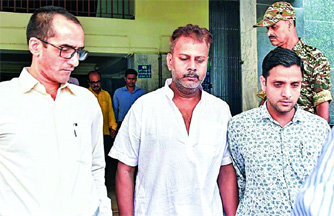
Kolkata (TIP)- A CBI court, denying bail to former RG Kar Medical College and Hospital principal Sandip Ghosh, has observed that the nature and gravity of the accusation against him is grave and it can attract capital punishment if proved. The CBI had arrested Ghosh and former officer in-charge of the Tala police station, Abhijit Mondal, for alleged tampering of evidence and delay in filing of FIR in the rape and murder of a doctor at the state-run hospital on August 9. The court in its order, dictated on September 25, said it appeared from the case diary that the process of investigation by the central probe agency was in full swing. Denying the bail prayer of Ghosh, Additional Chief Judicial Magistrate S Dey observed that the nature and gravity of the accusation was grave and if proved, it might attract capital punishment.
The judge said the court was of the opinion that “it would be injustice flouting the principle of equity to release the accused on bail”.
He said in the order that a person might commit an offence with the help of other/s, and there was no need to be present for the other accused at the place of occurrence. The court also rejected the bail prayer of Mondal.
It granted the CBI’s prayer for judicial custody of the two accused till September 30. Ghosh’s counsel claimed before the judge that he was falsely implicated and there was no act on his part to commit the crime as alleged.
CBI seeks report from Bengal govt on biomedical wastes
The Central Bureau of Investigation (CBI), which is conducting a probe into the financial irregularities at state-run R.G. Kar Medical College & Hospital in Kolkata, has sought a report from the West Bengal health department on the general practices adopted in case of disposal of biomedical wastes in different medical colleges and hospitals in the state.
The development is significant amid allegations that a major part of the alleged financial scam at R.G. Kar pertained to the smuggling of biomedical wastes.
Sources said that among the queries made by the central agency to the state health department, the first is the time when the central policies regarding biomedical wastes were implemented in the state.
The second was whether the state health department had been monitoring the medical colleges and hospitals for sticking to the laid down norms on the disposal of biomedical wastes. Sources said the CBI officials have traced severe irregularities in the disposal of biomedical wastes.
As per rules, the biomedical wastes of any hospital are supposed to be disposed of following a particular procedure to eliminate the chances of their reuse. However, in the case of R.G. Kar, a major part of the biological wastes having the potential of reuse like saline bottles, injection syringes and needles, among others, were sold in the market instead of being disposed of.
Each hospital is also supposed to maintain a record of the amount of biomedical waste being disposed of by its authorities over a certain period. Often it has been noticed that in the case of R.G. Kar the quantum of the biomedical wastes disposed of by its authorities during a certain period is much less than what was reported by other state-run medical colleges and hospitals of similar size during the same period.




Be the first to comment